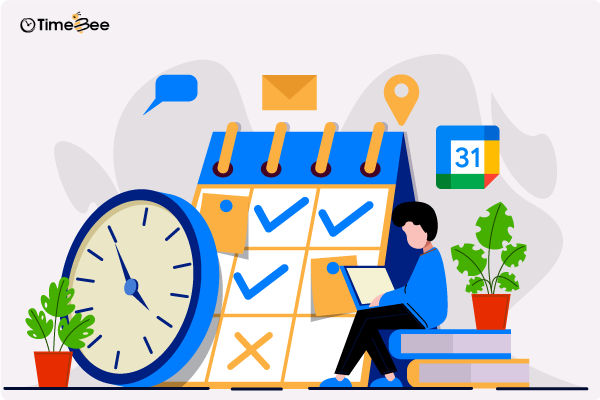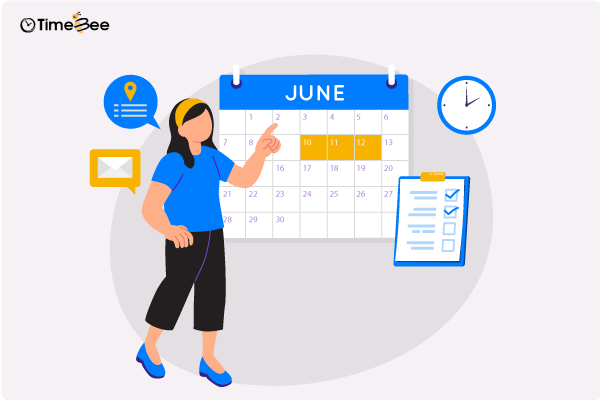Content
Content
Modern workplaces have become a nuisance where it’s hard to stay away from multiple distractions and still be focused.
However, just as every problem has a solution, this one does too. If you want to be more productive, meet deadlines faster, become better at your work, and feel good about yourself overall, you’ll have to master “Self Discipline.”
In simple words, self-discipline is figuring out how to stay focused by controlling your impulses and avoiding distractions. It is being steadfast and committed to the work in the present and staying immersed till you complete it.
But how would you go about it? That’s what we will be discussing in our today’s guide. Read through it and find out the 10 most reliable ways to improve self-discipline at work.
What is Self Discipline in the Workplace?
Self-discipline is:
- The ability to resist impulses
- Maintain focus
- Meeting project deadlines
It is described as a trait of a leader who persistently dedicates their attention to the tasks till they are completed in line with quality standards. They say those with high self-discipline are not easy to distract.
Self-Discipline in the Workplace
Self-discipline in the workplace is all about:
- Completing tasks without compromising on quality
- Meeting deadlines without creating chaos
- Being a reliable, responsible, and accountable team member
- Avoiding unproductive urges and spending time productively.
- You are controlling your time, not the other way around.
Not that we have covered the basics, let’s begin with the action. Below are the top 10 ways to be self-disciplined and consistent.
10 Reliable Ways to Improve Self-Discipline at Work
Self-discipline is a routine, and to practice it, we need to build a habit. Once you pass the initial stage of practicing it consciously, you’ll start mastering it, and in no time, you’ll be practicing it without even knowing.
1. Understanding Self-Discipline
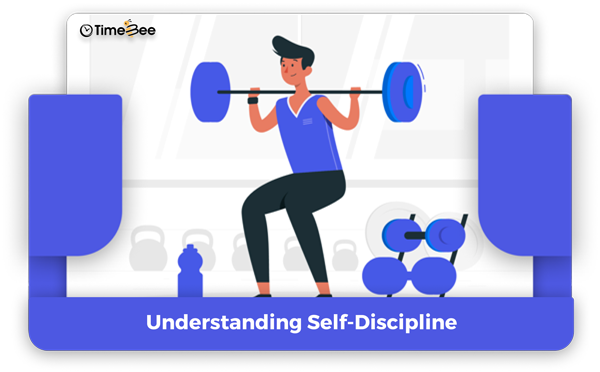
Before you get deep into self-discipline practices, understand its purpose.
Before you start applying all the tips and tricks here, try to figure out why you need self-discipline. Having a clear vision will make you unstoppable in your journey.
Here are some signs you might need self-discipline:
- You are struggling with your daily tasks and fail to meet deadlines.
- You have a short attention span and get easily distracted by non-work-related activities.
- You are not mentally present during meetings or conference calls.
- You are overwhelmed with work and work till the last minute because of poor time management.
- You can’t say “no” to things that hamper your attention to your work
2. Set Clear Goals

Once you figure out your individual needs, your next step is to set a clear goal for yourself.
Be measurable, specific, and realistic when setting goals for yourself. It will provide you with a roadmap to complete whatever you want to do successfully. Keep reviewing, analyzing, and evaluating your goals never get lost among other responsibilities.
Here are some actionable tips to set clear goals for yourself.
- Gather everything in a to-do list to follow
- Now, write down what you want from that particular goal. Be specific here. Describe in pointers.
- Next, decide a framework of how you will achieve and when. Be realistic while you decide on the timeline.
- Set a realistic deadline on how you’ll achieve your target.
3. Prioritize Tasks
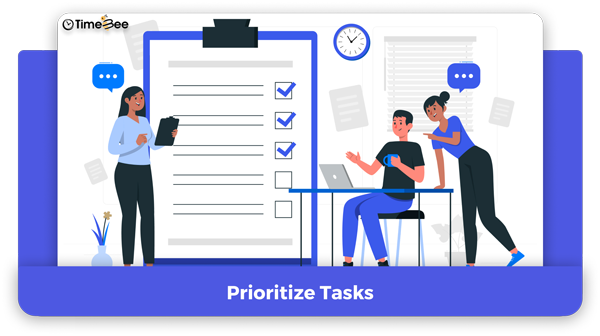
Prioritizing tasks is a surefire way to organize tasks – and requires a sustained level of self-discipline. The problem most people face is not being occupied. It is the wrong prioritization of tasks.
You don’t need more time; you just need to get better at prioritizing your day. For this, here are strategies to prioritize your work efficiently and tick all the to-dos on your list effectively.
- Identify the most important tasks you must complete.
- Create a group of similar tasks that can be done easily at once or one after another without wasting much time.
- If there is any task that is too big to handle at once, break it down into smaller chunks and then start working on it.
- Ask your colleagues and delegate tasks that they can handle.
- Use digital tools to maintain your records.
4. Create a Structured Routine
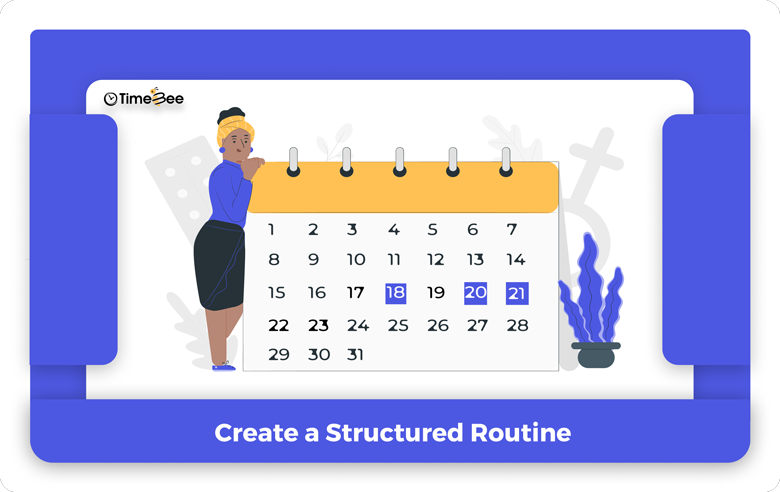
“The secret to your success is found in your daily routine.” – John Maxwell
Consistency can help you engrave your new daily routine into your habit. But it can be challenging. Sustained efforts toward an end goal requires unwavering discipline.
Here are some pro tips for building a routine and following it every day:
- Make up your bed as soon as you wake up.
- Spend time with yourself; meditate, do some stretches and exercises, and have a healthy breakfast.
- Set your intentions for the day and create a schedule.
- Set aside time for breaks, lunchtime, other important tasks, and sudden emergencies.
- Don’t try to multi-task
- Stick to your routine. If you miss something, don’t skip it. Start from where you left off.
5. Minimize Distractions
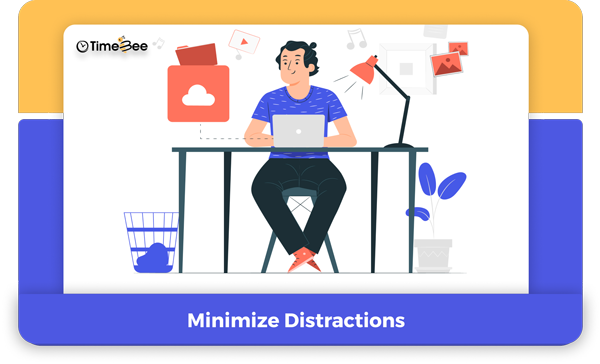
It is important to minimize distractions as much as possible. It won’t only help you be more productive, but it will also eliminate errors from your work. Moreover, you’ll stay focused, which will help you meet deadlines faster and be more productive with your approach.
With the following strategies, you can take control of your distractions and win at your work.
- Keep your phone aside, or turn it off.
- Close any tabs on your web browser that don’t relate to your work.
- Use noise-cancelling headphones in noisy environments.
- Block unnecessary websites that distract you while working.
6. Time Management

If you don’t respect your time, no one else will. So start managing your time to be more productive. You work almost 8-9 hours. This gives you 480 minutes a day.
There are various time management methods that you can use, including time blocking, time batching, and more.
If you’ve tried any of these but were unsuccessful, then combine the below tips and give your method a shot once again.
- Be realistic about your deadlines.
- Plan your day the night before.
- Always schedule unexpected interruptions and emergencies in your to-do list.
- Prioritize the most important task and complete it first.
- Invest in a good time management tool that helps you clock hours and categorize your time into productive and unproductive.
7. Accountability Partners

If you think you can’t keep a check on yourself, it’s always good to ask for some help. Get your trusted colleague onboard as your accountability partner. Both of you can build a routine and ensure you follow.
This collaboration will keep you motivated and give you the strength to march forward even when the weather is grey.
Here are some useful tips on choosing the right partner to join you on this self-disciplined journey.
- Opt for a colleague who shares similar values and goals
- Choose someone who not only holds you accountable but is also your biggest support and encouragement.
- Consider someone who is reliable and consistent
- Ensure you choose someone who provides open feedback and is also open to constructive criticism.
8. Self-Motivation Techniques
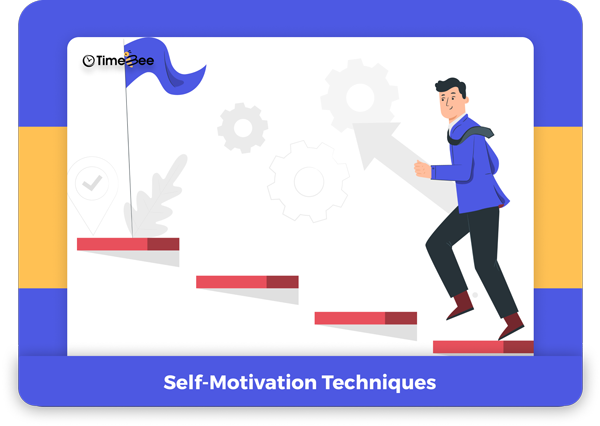
If nothing else works, boost your endorphins by becoming your self-motivator and inspire yourself. When you become independent from the external variables, they stop bothering you.
If no one cheers you, be your cheerleader. Find out some actionable self-motivation techniques that will ease the process for you.
- Set goals that align with your values and inspire you.
- Manifest achieving your goals by working on it every day, be it only 5 minutes or 10 minutes.
- Find ghost mentors. Learn from those who have walked the path. Read their books, watch documentaries, and connect with them.
- Affirm yourself every day. See yourself in the mirror and give motivational speeches to yourself.
9. Overcoming Procrastination
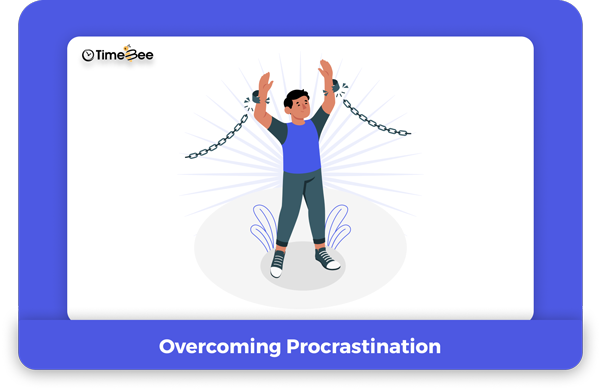
One day, or day one. Only you can decide for yourself. Leaving things for the next day is one of the biggest examples of procrastination. It not only wastes your time, but this is also a demotivator.
If you don’t act fast, chances are you’ll never do it. And this will hamper your everyday schedule. However, you can stop procrastination by applying some of the tricks given below.
- Huge tasks can become burdens, so break down these into smaller manageable chunks.
- Give yourself deadlines and ensure you meet them.
- Eliminate distractions by consciously stopping yourself from things that are wasting your time—for example, excessive phone usage, etc.
- Apply Elon Musks 5 minutes rule. If anything takes 5 minutes to do, then don’t wait for the right time. Just do it.
10. Use a Time Tracker

After the pandemic, many companies have adopted the practice of using time trackers on employee computers.
With time trackers, you can easily manage your time, projects, and other activities. Here are some of the best tips on using a time tracker to become the best at your work and life.
- Schedule your projects and track your time on that project.
- Activate the distraction alert pop-up to prompt on your screen if you are deviating from your task.
- Evaluate and analyze productivity reports to identify roadblocks and work on them
- Set deadlines for yourself to ensure you complete your work on time.
| TimeBee is one of the best examples of a complete time-tracking and productivity app that provides multiple top-of-the-line features. It is a great way to instill self-discipline in your employees. It cultivates self-discipline in teams through precise tracking and accountability. TimeBee’s time-monitoring features ensure focused work hours and discourage distractions. With TimeBee, you can set tasks and deadlines to encourage goal-oriented behavior and boost productivity. The software’s reporting tools provide insights into time usage which develops awareness and prompts individuals to prioritize tasks effectively. It also provides distraction alerts and reminders to promote a balanced workflow and prevent burnout. TimeBee’s transparency instills responsibility as team members recognize their contributions and areas for improvement. Ultimately, its systematic approach helps in forming disciplined work habits, enhancing efficiency, and developing a culture of accountability within the team. Whether you are a huge team or a small group, TimeBee has the solution for everyone. Its easy-to-use interface and prompt customer support make it one of the easiest apps to implement in the office. |
Summary
Self-discipline cannot be forced. It has to be your decision. It may feel like you can never self-discipline yourself, but if you follow the above given 10 ways meticulously, you’ll surely be able to master the art in no time.
The above-given ways are suggested by our experts who have studied the subject deeply. So stay positive and be consistent when you are applying the tips and tricks on yourself. They will work if you follow them religiously.
Frequently Asked Questions About Self-Discipline
How can I improve my discipline at work?
Improve your work discipline by following the steps below.
- Step 1: Set clear goals about what you want to do today
- Step 2: Prioritize the asks you have planned for today.
- Step 3: Create a schedule to manage your time.
- Step 4: Identify and eliminate all the distractions
- Step 5: Be accountable for what you have decided and stick to it.
By following this 5 step routine, you’ll enjoy your work without overwhelming or burdening yourself.
How to get self-control?
Have better self-control on yourself by applying the following tips.
- Keep yourself motivated by affirming yourself, “You can do it.”
- Rest well by getting a good night’s sleep so you are fresh in the morning.
- Stay focused and keep doing self-control exercises.
- Have SMART (Specific, Measurable, Attainable, Relevent, and Time-bound) goals.
- Use a digital self-control app.
When you combine all these top 5 tips, you’ll start mastering self-control in no time.
Why discipline is important?
Discipline is important to achieve your goals and targets without overwhelming or overstressing. It:
- Trains our mind and body.
- Helps us stay steadfast and focused
- Regulate our emotions better
- Have a healthy work-life balance
- Help you discover your talents and understand yourself better.
How can I improve my self-confidence?
Improve your self-confidence by applying the below-given tips below and practicing them daily.
- Create a self-care routine. Get better sleep, drink more water, etc.
- Start loving yourself. Be forgiving of your past traumas and other mistakes.
- Start physical activity. When you are physically fit, you start feeling better about yourself.
- Look after your diet. You become what you eat.
- Start regular meditation and mindfulness practice.
- Sign up for a self-confidence-building program or join a social group
Similar Reading


